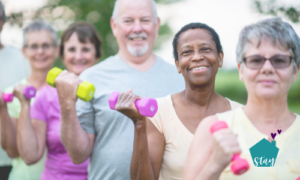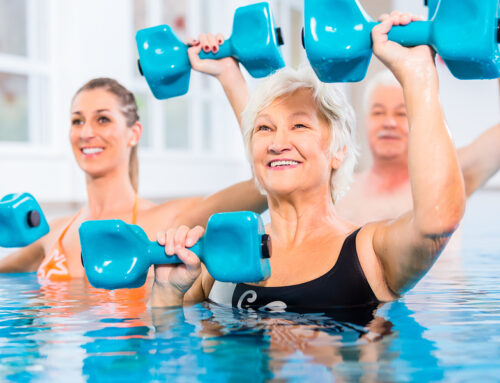
Exercise and Seniors: Counteracting Aging
Aging takes a toll on the body but one of the best ways that seniors can stay as healthy as possible is by staying physically active. Now is an excellent time to educate yourself on the importance of keeping seniors active. Once you learn about the benefits, you can let your loved one’s elder care aides know all about the types of activities they should be doing.
Should Seniors Even Exercise?
Not only does physical activity strengthen an elderly person’s body, but it contributes to positive mental health and well-being. Medical experts have determined that the elderly should be as active as they possibly can, and that inactivity can be detrimental to their health. They say that the long-term health benefits of exercise and activity can provide amazing benefits to seniors of all ages.
Many people worry that seniors should not exercise because it isn’t safe for them or they may hurt themselves. However, with approval from a doctor, physical exercise in seniors is definitely encouraged. Age and ability should help determine the type of activities the elderly should engage in. For the most part, exercise and activity benefits them far more than any risks they might encounter. As a family caregiver, you can encourage your aging loved one to be active and even participate with them as needed. Elder care aides can also remind and encourage seniors to get up and get moving.
Why is Physical Activity in Seniors Important?
Encouraging exercise as part of an overall senior care plan ensures that the elderly loved one reaps the enormous benefits that it provides. Not only does regular exercise boost long-term health in seniors, it can improve balance, elevate mood, prevent future diseases and injuries, and make aging bodies stronger and more self-sufficient.
Not only does exercise improve mobility and strength in seniors, it can help relieve stiff joints, encourage blood flow, improve healing and recover faster from injury and illness. Seniors that exercise will have more strength to support themselves, enjoy better balance, improved digestion and an increased appetite. Seniors will even experience better mental health as a result of minimal exercise several days per week. Of course, many physical activities are also social ones, from water aerobics and dancing to walking and light weight lifting.
What Type of Exercise is Appropriate for Seniors?
Because seniors do not have the endurance or the strength for many types of exercise, it’s important to tailor the activities to the individual. Aerobic exercises that are low impact might include walking, water aerobics, water resistance exercises, swimming, and more. Strength training includes exercises that have the senior working against resistance, such as light weights, exercise bands, rowing machines, and simple body weight exercises like leg raises. Even stretching and flexibility exercises benefit seniors, such as yoga, tai chi, Pilates and more.
There’s no doubt that your elderly loved one can benefit from a simplified exercise plan that encourages activity several times per week. Even unusual activities like birdwatching, ping pong, golf, and vigorous gardening can all be included in an elderly care plan. Of course, any exercise regimen should be approved by a doctor and adjusted for medical conditions, current ability and more. With proper guidance and ongoing supervision, there’s no reason why every senior can’t enjoy the benefits of exercise to stay physically well.
If you are located in New Jersey, contact Home to Stay today to learn more at (856) 321-1500 (Cherry Hill) or (732) 820-9611 (Red Bank).







